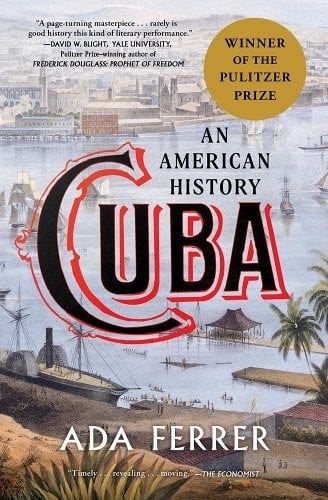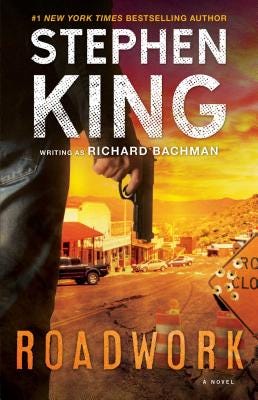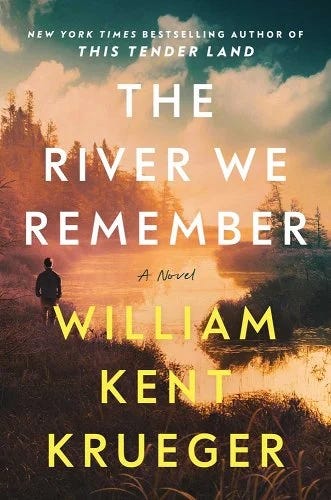What to Read Next: The Importance of Place
Issue #300, featuring "Roadwork" and "The River We Remember"
Happy Friday, readers!
Somehow, impossibly, I’ve reached the 300th edition of this Friday newsletter! I started it back in 2018, just weeks before our second kiddo was born. That wasn’t the world’s best idea, but I did it. And I’m proud to have only missed one or two Fridays since.
I often get asked how I keep that level of consistency. I think it’s important to note that it is not a testament to being hardworking or super disciplined; it’s actually just because I love books and I love sharing books with others.
It’s hard to believe how much this little publication has grown. I have nothing but gratitude for each and every one of you and I’m in awe of this audience.
Here’s to hoping for 300 more.
Okay, enough about that. To the books.
Pulitzer Update
I was going to write more about Bruce Catton’s Civil War trilogy, but I feel like I covered it about as much as I want to in Tuesday’s newsletter. If you’re a Civil War buff, it’s a must-read classic of that subject. If you’re not, it’s hard for me to recommend those thousand pages.
Currently, I’m reading Ada Ferrer’s Cuba, which is more interesting than expected! Always a fun surprise when that happens.
Roadwork by Stephen King
“You can’t always understand something just because you did it.”
Published: 1981 | Pages: 235 | Genre: Fiction (Horror)
In some ways, Roadwork was a perfect reading experience — even though the book itself isn’t perfect. Going into it, I knew I would like it to some degree for the simple fact that I love Stephen King — even his weird and less impressive stuff is enjoyable to me. Overall, though, my expectations were pretty low. This isn’t a title that you ever find in lists of King’s best books and the Goodreads rating is pretty low (in comparison to his other stuff).
So I was thrilled to instead find what I think is one of Stephen King’s most underrated stories.
Roadwork centers on Bart Dawes, whose life is about to be upended because of a highway. Both his home and his workplace have been taken from him via eminent domain, which, as you can imagine, completely changes everything he’s ever known.
King is always at his best when living in the head of an individual who feels aggrieved, is responding to a changing world, and is slowly descending into madness.
Bart Dawes checks all those boxes.
Though the plot itself — a man plotting how he’s going to keep his family and livelihood intact — isn’t exactly the most compelling on its own, the story always kept moving. At its core, this is a deeply psychological novel about the importance of place. There’s so much memory and grief and hope and loss tied up in these places that Bart is on the verge of losing — he doesn’t know who he’ll be without his neighborhood.
King’s reflections on grief and why we do the things we do are as poignant as I’ve seen in his writing, but he’s never trying to get across some heavy-handed message (like he does in some of his stories). For a quick, underrated, psychologically penetrating read this October, look no further than 1981’s Roadwork.
The River We Remember by William Kent Krueger
“There had been a time, a very long time, when there'd been no humans on this land, and . . . someday it would be that way again. All that men had done to prove their ownership, their mastery, would be undone.”
Published: 2023 | Pages: 421 | Genre: Fiction (Crime/Historical)
I’ve long enjoyed William Kent Krueger’s crime novel series set in northern Minnesota and starring dogged investigator Cork O’Connor. To be honest, though, after reading eight of those, they started to blend together. What really sets Krueger apart, in my opinion, are his three outstanding standalone novels — including the newest one, The River We Remember, published this fall.
In mid-century southern Minnesota, a prominent citizen and landowner has been murdered. Nobody particularly liked the guy, but Sheriff Brody Dern is nonetheless tasked with finding out what happened. From the start, Dern had a hunch that the case wouldn’t be cut and dry. He was right.
This is a small community that’s still haunted by the ghosts of World War II. Stereotypes abound; messy but protective families hamper the investigation; the land itself cries out to reveal its bloody history.
The murder mystery had me hooked, to be sure, but Krueger really excels at giving readers a glimpse into mid-century American life — both its nostalgic charms and its darker current of swept-under-the-rug abuses.
By the end, I thought Krueger was delving into one too many story threads (a common occurrence in modern murder mysteries; Agatha would be rolling in her grave), but the entire experience was delightfully satisfying nonetheless. I can’t guarantee I’ll keep up with his Cork O’Connor series, but any William Kent Krueger standalone is a must-read for me. The River We Remember is a fantastic read for readers of all stripes.
Note: Sexual assault plays a somewhat prominent role in the storyline.
Thanks so much for reading! I deeply appreciate your time and inbox space.
-Jeremy





I knew you’d get to 300, never doubted for a second.
Are this tender land and ordinary grace the other two standalones of Krueger's? I just read ordinary grace and loved it.